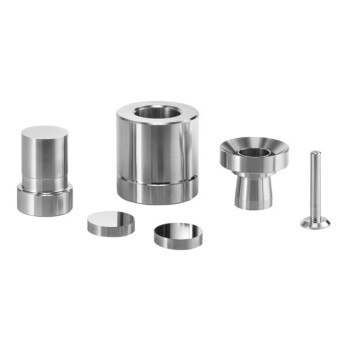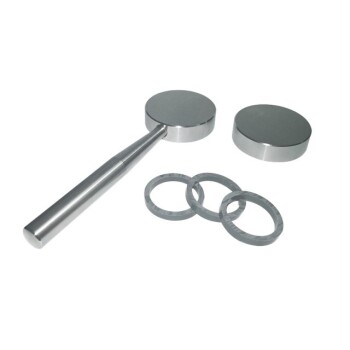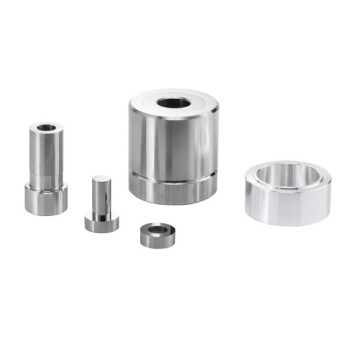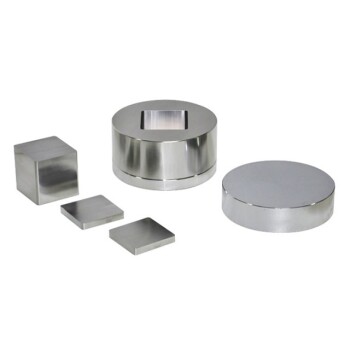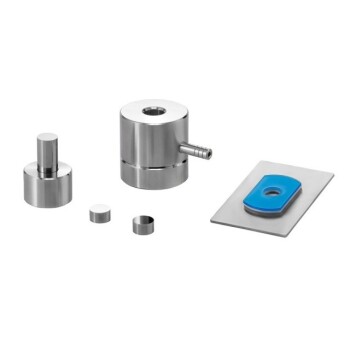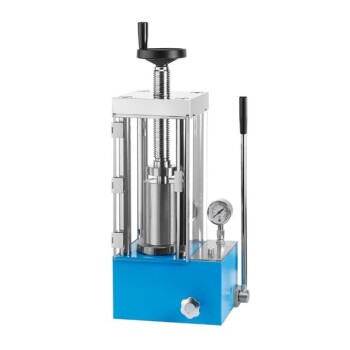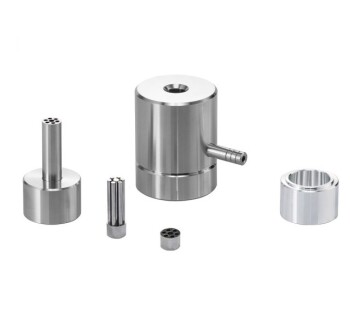In pharmaceutical development, a lab pellet press is primarily used to convert powdered active pharmaceutical ingredients (APIs) and excipients into uniform, solid pellets. These pellets are essential for conducting critical analytical tests, including dissolution testing, stability studies, and bioavailability assessments, which generate the data required for regulatory approval.
The core function of a lab pellet press extends beyond simple sample formation. It is an indispensable tool for ensuring experimental consistency, generating the reliable and repeatable data that underpins drug safety, efficacy, and quality control throughout the development lifecycle.

Why Pellet Uniformity Is the Bedrock of Reliable Data
The entire value of a lab pellet press in a pharmaceutical setting hinges on one principle: consistency. Inconsistent samples lead to variable test results, rendering months of research inconclusive and potentially delaying regulatory submissions.
The Principle of Controlled Compression
A lab press works by placing a precisely measured amount of powdered material into a specialized mold, known as a die.
The press then applies immense, controlled hydraulic pressure to compact the powder into a solid, uniform pellet with consistent density, size, and shape.
Ensuring Repeatability in Experiments
When every pellet has the same physical characteristics, it removes a major variable from any subsequent analysis.
This ensures that differences observed in test results—such as how quickly a drug dissolves—are due to the drug's formulation, not inconsistencies in the sample preparation itself.
Core Pharmaceutical Applications
The consistent pellets created by a lab press are foundational to several key stages of drug research and development.
Dissolution Testing
Dissolution tests measure the rate at which an active ingredient dissolves from a solid dosage form into a liquid medium, simulating what happens in the body.
Uniform pellets ensure that the dissolution rate is a true reflection of the formulation's properties, providing critical data for predicting a drug's performance.
Stability Studies
Pharmaceuticals must be tested for degradation under various environmental conditions like heat and humidity.
Using compressed pellets allows researchers to accurately assess the chemical stability of the drug substance over time, as the uniform surface area and density prevent skewed degradation rates.
Bioavailability Assessments
Bioavailability refers to the proportion of a drug that enters circulation and has an active effect. While often tested in later stages, early physical characterization helps predict this.
The characteristics of a compressed pellet can provide initial insights into how a drug might be absorbed, guiding further formulation development.
Spectroscopic Analysis for Quality Control
Techniques like Fourier-transform infrared (FTIR) spectroscopy are often used to verify the identity and purity of raw materials and final products.
Pressing a powder into a thin, uniform KBr (potassium bromide) pellet creates an ideal sample for analysis, ensuring a clear and accurate spectral reading without interference.
Common Pitfalls and Best Practices
To ensure data integrity, the press itself must be maintained in a state of perfect operational readiness. Neglecting the instrument introduces the very variability it is designed to eliminate.
The Risk of Inaccurate Force
The amount of force applied directly impacts pellet density and integrity. An uncalibrated force gauge can lead to inconsistent compression.
Regular calibration is not optional; it is essential for guaranteeing that the force applied is the force intended.
Contamination and Material Integrity
Any residual material left in the die from a previous run can contaminate the next sample, corrupting analytical results.
Thorough cleaning of the die and press surfaces after every use is a non-negotiable step in the standard operating procedure.
Mechanical Wear and Tear
Hydraulic systems and moving parts are subject to wear. Leaks, cracks, or worn seals can compromise the press's ability to apply consistent pressure.
Routine inspection for damage and regular lubrication of moving parts prevents unexpected failures and ensures long-term reliability.
Making the Right Choice for Your Goal
The application of a lab pellet press can be tailored to the specific objective of your pharmaceutical work.
- If your primary focus is R&D and Formulation Science: Use the press to create highly consistent pellets to reliably compare the dissolution and stability profiles of different drug formulations.
- If your primary focus is Quality Control (QC): Leverage the press to prepare samples for spectroscopic identification, ensuring raw materials and finished products meet purity and identity specifications.
- If your primary focus is Process Development: Employ the press to simulate the compression forces of large-scale tablet manufacturing, helping to identify potential production issues early.
Ultimately, mastering the use and maintenance of a lab pellet press is fundamental to producing the high-quality, defensible data that drives successful pharmaceutical development.
Summary Table:
| Application | Key Use | Benefit |
|---|---|---|
| Dissolution Testing | Measures drug dissolution rate | Ensures accurate formulation performance data |
| Stability Studies | Assesses drug degradation under conditions | Provides reliable stability insights |
| Bioavailability Assessments | Predicts drug absorption | Guides early formulation development |
| Spectroscopic Analysis | Prepares samples for purity verification | Delivers clear, interference-free readings |
Unlock the full potential of your pharmaceutical research with KINTEK's advanced lab press machines! Whether you're in R&D, quality control, or process development, our automatic lab presses, isostatic presses, and heated lab presses deliver unmatched precision and consistency for pellet formation. Enhance your dissolution testing, stability studies, and analytical results with reliable equipment tailored to laboratory needs. Don't let sample variability hold you back—contact us today to discuss how KINTEK can support your drug development goals and ensure regulatory success!
Visual Guide

Related Products
- Laboratory Hydraulic Press 2T Lab Pellet Press for KBR FTIR
- Laboratory Hydraulic Pellet Press for XRF KBR FTIR Lab Press
- Laboratory Hydraulic Split Electric Lab Pellet Press
- Laboratory Hydraulic Press Lab Pellet Press Machine for Glove Box
- Automatic Laboratory Hydraulic Press Lab Pellet Press Machine
People Also Ask
- What are some laboratory applications of hydraulic presses? Boost Precision in Sample Prep and Testing
- Why must a laboratory hydraulic press be used for pelletizing samples for FTIR? Achieve Precision in Spectral Data
- How do hydraulic press machines ensure precision and consistency in pressure application? Achieve Reliable Force Control for Your Lab
- What is the role of a hydraulic press in KBr pellet preparation for FTIR? Achieve High-Resolution Chemical Insights
- Why is sample uniformity critical when using a laboratory hydraulic press for humic acid KBr pellets? Achieve FTIR Accuracy






